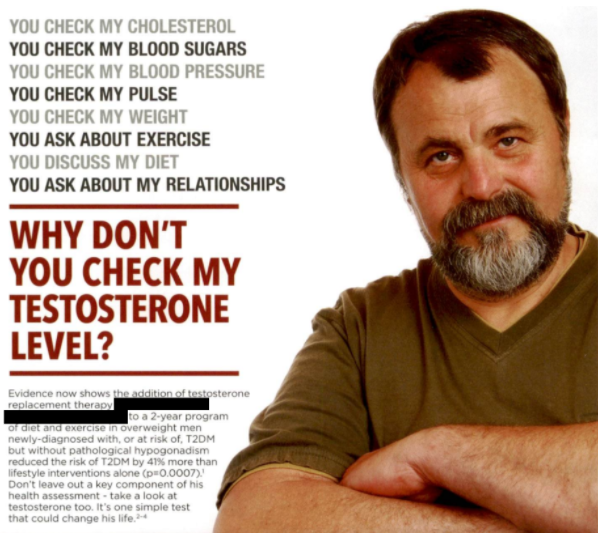
When I arrived in the United States, one of the first things I did was turn on network TV and wait for something I’d heard about but never seen — advertisements for prescription medication.
For 30 seconds I watched someone journey from grey, gloomy husk to colourful, bubbly socialite living their best life. Simultaneously the voiceover warned me I could experience side effects that may include diarrhoea or an inability to find the car keys or something along those lines. The warnings were forgettable but the positive imagery and the name of the drug stuck.
Thankfully, advertising prescription medication directly to consumers is prohibited in Australia. Instead the drug companies direct their influence towards doctors via traditional media and by inserting themselves into medical education and networking events.
Print ads
Medications are advertised in a never-ending stream of pamphlets and medical tabloids that make their way to doctors’ offices daily. In the same way that everyone expects their Big Mac is going to look different from the one on the billboard, these ads should be approached with healthy scepticism.
Men’s health ads are typically fronted by the straight-shootin’ bloke who just wants the facts.

Routine screening for testosterone deficiency is not recommended, unlike the other health activities on that list.
Some ads will dazzle with an incredible new research finding!

Truly a game-changing finding if the goal is to stop people feeling a bit peckish, but it tells us nothing about efficacy regarding the actual goal of weight loss.
Ads for immunisations will often motivate using guilt and fear, taking on the tone of an underworld enforcer.

Such nice people. So much to live for. Wouldn’t it be a shame if they, I don’t know, died of pneumonia?
Cash Kebab for comment
It is well established that engagement with pharmaceutical representatives and literature alters a doctor’s prescribing habits. Engagement increases total prescriptions written and they are more likely to prescribe medication that is more expensive.
The industry is well aware of this, and before social distancing pharmaceutical representatives could be found at least once a week in most medical offices and hospitals, providing lunch in exchange for five minutes of audience captivity and a discussion of their latest products.
Drug companies also organise and sponsor educational activities as an opportunity to influence under the guise of education. Doctors are required to participate in structured education sessions and record a log of that participation as a condition of medical registration. The sponsored education sessions are convenient for meeting professional development quotas and will often include a gift of dinner and stationery.
If the doctors engaged by pharmaceutical interests to present these sessions require compensation in excess of food and stationery, they may receive travel expenses to present at local meetings or conferences anywhere in the world.
Research from the Charles Perkins Centre at the University of Sydney analysed 116,000 medical educational events over four years and found about two-thirds had drug company involvement, leading the researchers to describe pharmaceutical commercial influence in Australian prescribing as “endemic”. They created a free-to-access database for anyone to see how much individual doctors have received and from whom.
Here to stay
Though motivated by profit, the relationships between business, doctor and consumer are symbiotic. The private sector plays a role in the advancement of medicine and we need some of their drugs for a better quality or quantity of life, even if the industry isn’t motivated by altruism. For anyone being prescribed a new medication, it is entirely reasonable to ask what promotional materials their prescriber has digested.
A certain amount of business influence is always going to be exerted on doctors but they can temper that by refusing to engage with pharmaceutical representatives, throwing the ads in the bin and attending educational events that are not sponsored.
The pandemic has stymied the ability of pharmaceutical interests to influence prescribing habits but as Australia opens up doctors should remember that life was possible without accepting their pens, PowerPoint presentations and sushi.








Ah, yes. Remember those days in the States when Oxycontin and other highly addictive artificial opioids were advertised to make your life so much better?
There are some great doctors, but so many are in a cash grab. That’s why they won’t let more study medicine despite our shortages. We have a chronic shortage of psychiatrists in many parts of the country but they won’t allow more locals to study medicine in cash it brings down wages. I am sure if they let a few more in it wouldn’t drop standards. Someone with a 97 ATAR can probably do the job just fine compared to a 99.95.
for Drs who work in public hospitals like Emergency Physicians, Intensivists etc, it’s illegal for them to accept any gifts from a drug company. The last drug company sponsored dinner my wife who’s an emergency physician went to at Bathers was nearly 20 years ago. The amount of money that drug companies used to throw at drs involved in long term care such as cardiologists used to be obscene
Such nice people. So much to live for. Wouldn’t it be a shame if they, I don’t know, died of pneumonia?… take the jab and no-one gets hurt… I like it! 😀
More and more doctors will be leaving altruistic medical ideals behind post Covid. They’ll be deserting the public system in droves, just like nurses. The price of burnout. The effects will be felt for decades. The pharmaceutical companies will be paying for many more dinners and “educational “ seminars, believe me. Thanks to PTSD, the winner will be the private sector. Our underfunded public sector will be ripe for the picking by corporations. And Morrison knows it, hence his refusal to further find the public sector even at the peak of its crisis. Gotta appreciate the Machiavellian ingenuity of it. Never let a good pandemic go to waste.
Further fund obvs